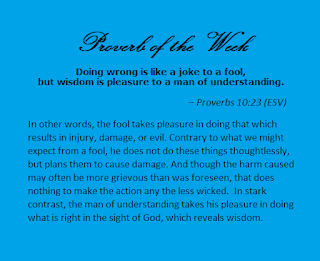Proverb of the Week
The spirit of man is the lamp of the LORD, searching all his innermost parts. - Proverbs 20:27 (ESV)
The spirit
of man, as spoken of here, may be understood as that aspect of living creatures
which separates humans from animals; a self-awareness which transcends the
physical body. When this spirit of man searches his own heart to recognize good
and evil we might refer to it as his conscience, which is a gift from God given
to every man, but not to be confused with the Spirit of God which dwells only
within believers. When an unbeliever’s will overrules his conscience to surrender
to his wicked desires repeatedly and consistently, that lamp will become little
more than a flickering ember that is swallowed up by the darkness. In contrast,
God has promised that his Spirit, once dwelling within us, will
never leave us, and it is this Holy Spirit who provides the light which can
never be extinguished. As John 14:16-17 tells us: And I will ask the Father, and he will give you another Helper, to be with you forever, even the Spirit of truth, whom the world cannot receive, because it neither sees him nor knows him. You know him, for he dwells with you and will be in you.
As further support
for this understanding of the Proverb, I would cite 1 Corinthians 2:11-12 which says: For who knows a person's thoughts except the spirit of that person, which is in him? So also no one comprehends the thoughts of God except the Spirit of God. Now we have received not the spirit of the world, but the Spirit who is from God, that we might understand the things freely given us by God.






















